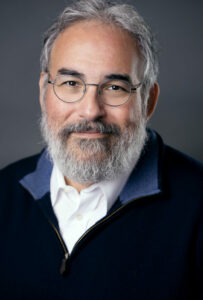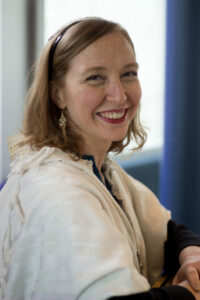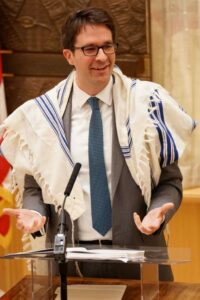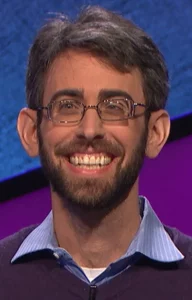From Rabbi Brad Hirschfield, President, Clal
What view are you taking as we wrap up 2023 and begin 2024? In fact, most people and places that cover those questions look at one or the other, but not at Clal. For us — for all of us, and not only at Clal — our pasts and our futures are interdependent.
How we see our past influences the futures we aim to create, and our aspirations and expectations for the future color how we see our past. So, we are taking a moment to get both our cameras and our crystal balls and do both — take a snapshot of the year that was, and look ahead to the new year that is coming, specifically for our work, what we have achieved this year, what we have learned this year, and how those learnings will shape us in the year ahead.
I look at a world that has never needed us more. We are every bit as siloed and polarized as we were when the organization was founded almost 50 years ago. At the same time, I see us achieving with and for a wider audience of influentials and institutions than ever before — both those at the very center of organized Jewish life and non-Jews in media, the military, the not-for-profit sector, and more — all seeking the wisdom and skills that breakdown debilitating false dichotomies, without sacrificing sacred values and core commitments.
And perhaps most importantly, when I look back on the past year, I try not to let my vision be limited to the last months. It’s not easy for all sorts of reasons, but I know that it is never good to read the entire story of the past year based only on its closing chapters. And the same holds true for the coming year. I know that I can’t know all that it will bring because, despite the metaphor, I don’t have a crystal ball. But this much I do know — in the same way that this past year brought challenges and opportunities that I could not have fully anticipated, the same will be true for 2024.
The ongoing learning for me is to remember that and to always challenge myself to see positive potential, especially when also engaged in responding to negative realities. In fact, I think that getting increasingly good at the former makes us increasingly effective with the latter. It comes down to always sharpening what is among the most critical leadership skills I know and hope we teach to all those we serve — the ability to be fully in the moment but never fully defined by the moment we are in.
 From Rabbi Elan Babchuck, Executive Vice President
From Rabbi Elan Babchuck, Executive Vice President
Perception is reality, and it always has been. Is the economy healthy? Did we achieve a “soft landing”? Depends on who you ask. Has Biden handled the war well? Depends on who you voted for. Looking back on a year that deepened our divides – red and blue, right and wrong, hope and cynicism – I’ve met plenty of folks who have scrambled to more extreme positions, taking shelter from the vicissitudes of the day to find perfect moral clarity on the edge. But, as I’ve traveled around the country and the world this past year with Clal fellows and for projects with the U.S. Armed Forces Chaplains Corps, I’ve stumbled upon a different truism: perception is relational, too. Anecdotally, I’ve found that people who have at least one person in their inner circle who is willing to disagree with them – who is courageous enough to question norms, who dares to zig into complexity while others zag into certitude – experience a much more spacious, inviting, and hope-filled reality than those who don’t.
2024 predictions: In my earlier reflections on the year that was, I noted that perception is relational and that people who sought out nuance seemed much more hopeful than those who retreated to relative moral high ground. The yoke of this polarization is often (mis)placed upon the necks of young people – those “gullible”, “vulnerable” generations who have succumbed to the ills of social media’s addictive and toxic algorithms, whose minds have been “polluted” by the moral decline of higher education. As it turns out, our youngest generations are the most likely of all generations to switch to “dumb phones” and quit social media (34% of Gen Z have quit, and 64% are at least taking a break). And while the data isn’t yet ready to argue that they are also seeking out nuance in their educational pursuits, my prediction is that 2024 will prove this to be true, as well. In other words, for all the headlines declaring otherwise, our youngest generations will show us the way out of the tech-triggered polarization that has gripped our country and into a season of balance and hope.
 From Rabbi Julia Appel, Senior Director of Innovation
From Rabbi Julia Appel, Senior Director of Innovation
After a big year for Clal’s Belonging Project, with 15 congregations and thousands of Belonging survey respondents, I learned that the biggest impact of this work isn’t necessarily the creation of any particular program but rather a mindset shift. New programs, space renovations, changes to prayer services – these are easier to notice. However, participants in The Belonging Project talked more about how they see community building in a new way, and they ask different questions when discussing the life of the synagogue community. Who is this event designed for? How do we want people to feel at this gathering? Do we have any opportunities in this program for people to get to know each other? How can we increase the amount of serious conversations we have with each other? How are we enabling congregants to take care of each other? I’ve learned from the Belonging Project participants to pay close attention to this mindset shift.
 From Rabbi Joshua Stanton, Director of Leadership Formation, Co-Director of Stand and See
From Rabbi Joshua Stanton, Director of Leadership Formation, Co-Director of Stand and See
In a moment of crisis, such as the one Israel and Jewish communities everywhere have been in since October 7th, it is difficult to predict who our allies will be. To my joy, many have stepped forward from among the Stand and See alumni. They have reached out, spoken out, stood up, and helped us recruit for future Israel trips. They have taught their communities about the pain Israel is in right now. They have marginalized extreme voices in their communities — and sought to do so within their denominations. It had been both heartening and important learning to see the extent to which our alumni remain connected to Israel and dedicated to complexity and nuance amid this time of polarization and over-simplifications.
 From Rabbi Geoff Mitelman, Director and Founder of Sinai and Synapses
From Rabbi Geoff Mitelman, Director and Founder of Sinai and Synapses
At the beginning of November, Sinai and Synapses brought together thirty alumni of our interfaith Fellowship program. As we were preparing, we were understandably a bit nervous, as many of us were still in shock from the massacre of October 7th. While we had had significant experience bringing together people of different faith traditions, political perspectives, and different academic backgrounds, so many of these kinds of conversations and convenings – especially in interfaith settings and in universities – had gone poorly. The alumni gathering ended up being, however, in the words of one evangelical Christian pastor, “life-giving.” We closed our meeting with the Nava Tehliah version of Oseh Shalom – a melody only a few people in the room knew but everyone quickly picked up on. Afterward, I sent the audio to anyone who might be looking for it, and one of our Muslim participants wrote back, saying, “Thank you for sharing the song. I had been searching for it on the internet, so it was a delight to receive it.” We were reminded, once again, of the light we can bring even in these dark times. There are no simple solutions to challenges like balancing the particular and the universal, honoring free speech while combating antisemitism on college campuses, or having and maintaining deep conversations beyond simple slogans and memes on social media. Yet we saw the power of bridge-building across disciplines, religions, geography, and political perspectives; of making a space safe enough to have challenging conversations; of blending the professional and the personal; and of coming at big questions from multiple perspectives.
Looking forward toward 2024:
As Sinai and Synapses continued to grow, with over 60 synagogues involved in Scientists in Synagogues and nearly 70 alumni of our interfaith Fellowship, we kept hearing interest in the interplay of Judaism and technology. We realized the importance of working at two different speeds and in two different ways, and both are needed: one is responding to the latest immediate tool, whether that is ChatGPT, new forms of social media, or the search for extraterrestrial life. We need to offer practical advice on how best to use and react to these new technologies. But the other is proactive and more philosophical. The questions they raise are ones core to Jewish ideas — what makes humans unique? How do we balance our rights and our responsibilities? What happens when we no longer control our creations? Without a doubt, new technologies will be changing our lives in 2024, 2025, 2026, and beyond — we need to both bring our practical knowledge to bear on how they will impact our lives and explore how they reflect millennia-old questions that Judaism has grappled with.

Listed for many years in Newsweek as one of America’s “50 Most Influential Rabbis” and recognized as one of our nation’s leading “Preachers and Teachers,” by Beliefnet.com, Rabbi Brad Hirschfield serves as the President of Clal–The National Jewish Center for Learning and Leadership, a training institute, think tank, and resource center nurturing religious and intellectual pluralism within the Jewish community, and the wider world, preparing people to meet the biggest challenges we face in our increasingly polarized world.
An ordained Orthodox rabbi who studied for his PhD and taught at The Jewish Theological Seminary, he has also taught the University of Pennsylvania, where he directs an ongoing seminar, and American Jewish University. Rabbi Brad regularly teaches and consults for the US Army and United States Department of Defense, religious organizations — Jewish and Christian — including United Seminary (Methodist), Yeshivat Chovevei Torah (Modern Orthodox) Luther Seminary (Lutheran), and The Jewish Theological Seminary (Conservative) — civic organizations including No Labels, Odyssey Impact, and The Aspen Institute, numerous Jewish Federations, and a variety of communal and family foundations.
Hirschfield is the author and editor of numerous books, including You Don’t Have To Be Wrong For Me To Be Right: Finding Faith Without Fanaticism, writes a column for Religion News Service, and appears regularly on TV and radio in outlets ranging from The Washington Post to Fox News Channel. He is also the founder of the Stand and See Fellowship, which brings hundreds of Christian religious leaders to Israel, preparing them to address the increasing polarization around Middle East issues — and really all currently polarizing issues at home and abroad — with six words, “It’s more complicated than we know.”

